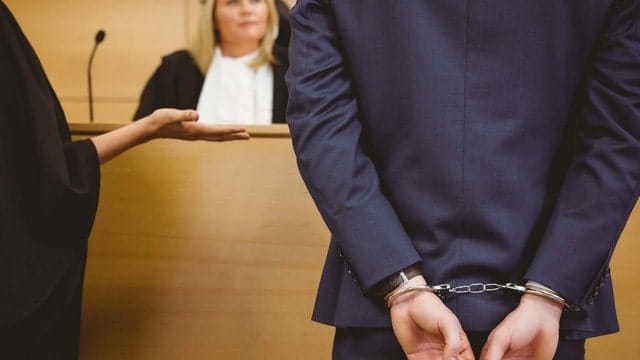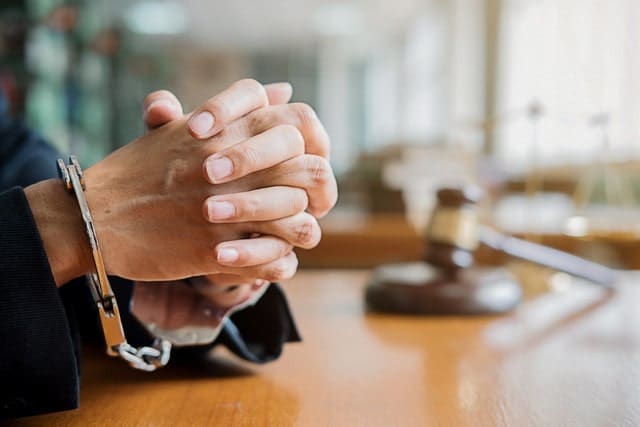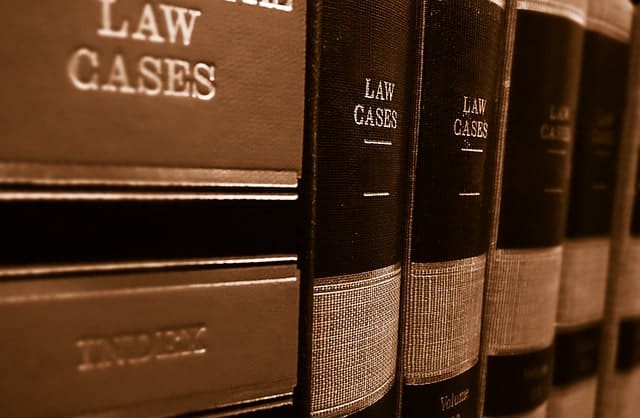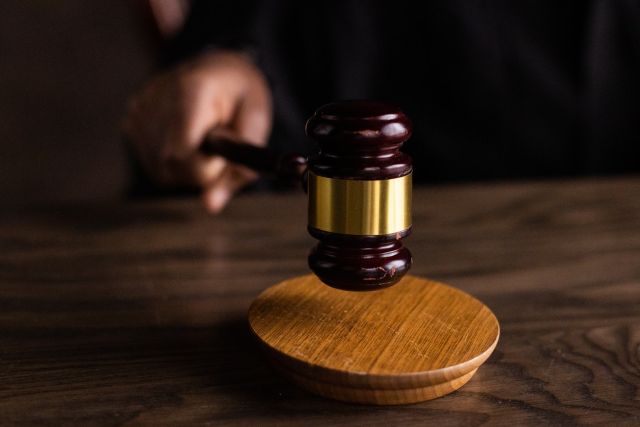- What Does it Mean to be Released on Your Own Recognizance?
- What Does Aiding and Abetting Mean?
- When Can You Plead the Fifth?
- Can the Police Search Your Car Without a Warrant?
- How Can You Take Advantage of the Situation if Your Crime Has Witnesses?
- What Is “Invoking Rights”?
- How Often Do Judges Reject Plea Deals?
- What Happens if You Have a Single Speeding Ticket?
- What Are Miranda Rights?
- What Are Some Good Sentencing Hearing Tips?
- Who Does the Burden of Proof Fall On?
- What Does by Right of Representation Mean?
- FAQ about Lie Detector Test in Missouri
- What Is the Right to a Speedy Trial?
- What Happens After an Arrest Warrant is Issued?
- Can a Victim Refuse to Testify?
What Does it Mean to be Released on Your Own Recognizance?
A suspect’s criminal trial may not begin for weeks or even months after he is arrested. Typically, the court will release the suspect from jail while he awaits trial in exchange for bail money. But sometimes, the court will release a suspect on his own recognizance instead. Here’s what you need to know about a release on your own recognizance:
What is a Release On Your Own Recognizance?
A suspect that is released on his own recognizance is not required to pay bail money. Instead, he must sign a document that states he will return for all court appearances in the future. The suspect may also be required to stay in the area or contact the court on a regular basis until his case has been resolved. If the defendant has been accused of committing an alcohol or drug-related offense, the judge could order him to attend a substance abuse program after he is released. Sometimes, the judge will even set a curfew for the suspect. If a suspect violates one of the terms of his release, a warrant will be issued for his arrest.
Who is Released on Their Own Recognizance?
It is up to the judge to determine which criminal defendants can be released on their own recognizance. The judge will take a number of factors into consideration when making this decision, including:
- The nature of the defendant’s crime
- The defendant’s criminal record
- The defendant’s ties to the community
- The defendant’s employment
- Whether or not the defendant poses a threat to the community
Based on these factors, a defendant with no criminal record that is accused of committing a minor, non-violent crime has a good chance of being released on his own recognizance. This is especially true if the defendant has family in the area and works full-time for a local employer.
However, a defendant with prior convictions who has committed a violent felony will probably not have a chance at this release since he is considered a danger to the community. A defendant with no ties to the community may also be denied this form of release since he is considered a flight risk.
For assistance with bail and other forms of release, contact us and let our experienced attorneys help.

What Does Aiding and Abetting Mean?
Missouri does not have a general law that explicitly prohibits aiding and abetting crimes, but there are various statutes that encompass the basic elements of aiding and abetting. Typically, aiding and abetting involves offering or giving some type of assistance to another to allow that person to engage in or get away with criminal activity.
Mo. Rev. Stat. § 575.020 establishes concealing an offense as a crime. Individuals commit this offense if they accept or agree to accept money or any benefit of value in exchange for concealing an offense, withholding evidence, or refraining from initiating or cooperating in the prosecution of the offense. This offense is a Class A misdemeanor unless the offense concealed is a felony, in which case the offense is a Class E felony.
A related crime is hindering prosecution pursuant to Mo. Rev. Stat. § 575.030. This statute makes it a Class A misdemeanor unless the actor hinders prosecution of a felony, in which case the offense is a Class E felony. This offense occurs when a person prevents the arrest, prosecution, or punishment of another person by:
- Harboring or concealing the person
- Warning the person about an imminent arrest or discovery by authorities
- Providing the person with money, transportation, weapons, disguises or anything else designed to help him or her escape arrest or discovery
- Using force, deception, or intimidation to prevent or obstruct anyone from performing an act that might aid in the discovery or arrest of the person
Other similar crimes that may contain elements of aiding and abetting are resisting or interfering with an arrest, aiding a sexual offender, refusal to identify a witness, aiding the escape of a prisoner, and tampering with a witness or victim, among others. All criminal offenses can result in serious consequences. At The Benjamin Law Firm, LLC, we pride ourselves on helping our clients through their legal difficulties related to general criminal offenses, including drug offenses, traffic violations, DWI, and expungement of criminal records.
When Can You Plead the Fifth?
The Fifth Amendment of the U.S. Constitution protects people from being forced to incriminate themselves in criminal cases. A person who chooses to exercise this right to protection from self-incrimination is said to “plead the fifth.” When should a person plead the fifth? Here’s when you need to exercise this right:
When You’re On Trial
Defendants have the right to choose whether or not they want to take the stand and testify in their trial. No one can force a defendant to take the stand, including the prosecution, defense, or judge since this would be a violation of his Fifth Amendment rights.
If you believe it is in your best interest to testify, you can take the stand and tell your side of the story. Otherwise, you can plead the fifth to protect yourself from self-incrimination. There are no consequences for pleading the fifth at trial. In fact, the jury cannot take this decision into consideration when deciding whether or not you are guilty.
When You’re A Witness
Defendants aren’t the only ones who are given the right to plead the fifth-witnesses can, too. If a witness testifies in a criminal case, he can plead the fifth to a question if he could incriminate himself by answering it. A witness is not refusing to take the stand when he chooses to plead the fifth. Instead, he is choosing not to answer specific questions that could lead to self-incrimination.
When You’ve Been Arrested
Shortly after you are arrested, law enforcement may start questioning you about the crime you are accused of committing. Your answers to these questions could be taken out of context and used as evidence against you later on in your case. For this reason, it is best to exercise your right to remain silent by pleading the fifth. Exercising this right can protect you from having to answer questions about your connection to criminal activity.
When You Cannot Plead the Fifth
The Fifth Amendment does not apply to the collection of physical evidence, such as DNA samples or fingerprints. Therefore, a defendant cannot refuse to provide this physical evidence to law enforcement even if he knows that providing it will prove he has committed a crime. In this situation, the Fifth Amendment does not protect defendants from self-incrimination.

Can the Police Search Your Car Without a Warrant?
There are some circumstances under which the police can search your car, even without a warrant. First, if you consent to the search, the police can legally search your vehicle. However, you are never required to consent to a search, so you generally should not do so. Nonetheless, you should keep in mind that you do not have the right to physically resist or attempt to prevent police officers from searching your vehicle. In certain circumstances, police officers can still search your vehicle without your consent, as detailed below.
Next, the police must have “probable cause” in order to search your car without a warrant. If a police officer has probable cause to believe that your vehicle contains contraband or other evidence related to a criminal offense, he or she can search your vehicle. Probable cause can stem from the police officer’s observations that you are nervous or otherwise acting suspiciously, that there is an odor of marijuana or alcohol coming from your vehicle, or that there is alcohol, drugs, or other contraband located in plain sight inside your vehicle. If a drug-sniffing dog “alerts” on your vehicle, police officers also have probable cause to search your vehicle.
Furthermore, if you are arrested during a traffic stop, either because there is an outstanding warrant for your arrest or because there is probable cause that you have committed a crime, a police officer has the right to search your car incident to your arrest in some cases. This type of search typically is limited to the immediate area in which you were seated in the vehicle, in order to prevent you from grabbing a weapon or destroying contraband or evidence related to a criminal offense.
Additionally, if you are arrested and the police officer decides to have your vehicle towed and impounded, police officers can conduct an “inventory” search of your vehicle. This allows police to itemize and retain any items in your vehicle that might be related to criminal activity.
How Can You Take Advantage of the Situation if Your Crime Has Witnesses?
Anyone who has been charged with a crime has a number of rights in trial that they must protect. Most people are familiar with some of these rights, such as the right to a speedy and public trial. However, one of the lesser-known rights protected by the U.S. Constitution involves a defendant’s right to call on witnesses during a criminal trial.
Right to Obtain Witnesses
The Sixth Amendment of the U.S. Constitution grants criminal defendants the right to obtain witnesses in their favor. Basically, this means every criminal defendant has the right to call his own witnesses to the stand for questioning during a trial. These witnesses can include alibis, experts, bystanders, and anyone else who can testify in support of the defendant’s case.
The prosecution has the right to cross-examine these witnesses even though they were called to the stand by the defense. During the cross-examination, the prosecution will attempt to weaken the defense’s case by questioning the reliability or plausibility of the witness’s testimony. Therefore, it is important for these witnesses to prepare to answer questions from both sides.
Right to Confront Witnesses
Another right that is guaranteed by the Sixth Amendment is the right to confront witnesses during a criminal trial. This simply means that every criminal defendant has the right to be present at his trial and the right to cross-examine the prosecution’s witnesses. The right to confront witnesses was established to prevent convictions based solely on written evidence. Instead, witnesses must take the stand and face both the defendant and the jury while under oath.
The right to cross-examine the prosecution’s witnesses is incredibly important in criminal trials. Since the prosecution has the right to cross-examine the defense’s witnesses, this criminal right levels the playing field.
A defendant cannot be denied his right to confront witnesses. However, the judge can limit this right under certain circumstances. For example, the judge may allow minor victims of abuse to appear as witnesses via closed-circuit television so they do not have to face their alleged assailant face-to-face.
Witnesses play a significant role in every criminal defendant’s case, so the importance of the defendant’s right to call and confront witnesses cannot be overstated.
What is “Invoking Rights”?
Anyone who has ever watched a TV show about crimes or police investigations has probably heard the saying “You have the right to remain silent.” Many people may know this expression, but very few understand what it means or the importance of invoking it.
What is the Right to Remain Silent?
Law enforcement officers must read your Miranda rights if they take you into custody and plan on interrogating you. The right to remain silent is one of your Miranda rights-and an important one, too. Invoking this right tells law enforcement that you will not answer any of their questions. If you fail to invoke this right when taken into custody for questioning, you may accidentally make an incriminating statement or say something that you do not mean.
Anything you say in questioning can, unfortunately, be used against you in court. Therefore, it is vital to invoke this right in order to reach the best possible outcome in your criminal case.
How to Invoke the Right to Remain Silent
It’s best to let law enforcement officers know that you are invoking your right to remain silent instead of simply staying quiet. If you stay quiet, the police officers can continue to question you to see if you start talking. However, if you make it clear that you are invoking your right to remain silent, the questioning must stop immediately.
If you are taken into custody, make it clear from the very beginning that you plan on taking advantage of your constitutional right to stay silent. You should invoke this right as soon as possible when taken in for questioning-do not make the mistake of answering a few questions first.
Be polite yet firm when telling law enforcement that you are invoking your right to remain silent. You can say something along the lines of “I am invoking my right to remain silent” or “I am choosing to remain silent.” Make sure you are speaking loud and clear so the police officers cannot claim that they did not hear you invoke your right to remain silent. No matter what the police officers say, it’s important to stand by your decision to remain silent.
Have you been accused of committing a crime? If so, invoke your right to remain silent-and your right to an attorney. The experienced criminal defense attorneys at The Benjamin Law Firm, LLC will work tirelessly to reach the best possible outcome in your case.

How Often Do Judges Reject Plea Deals?
Prosecutors are often willing to offer plea deals to defendants in order to save them the trouble of preparing for trial. In fact, the majority of criminal cases are resolved with plea bargains. Once the prosecution and defense have agreed on the terms of the deal, the details are sent to the judge presiding over the case. The judge has the authority to approve or reject plea bargains in criminal cases. Why would a judge reject a deal? Here’s what you should know:
What Factors Do Judges Consider When Reviewing Plea Bargains?
A judge will reject a plea bargain if he believes that the terms of the deal are not fair or appropriate. He will take a number of factors into consideration when reviewing a plea bargain, including the nature of the crime. For example, if the defendant is preparing to plead guilty to a violent crime, the judge will most likely reject a plea deal that offers the defendant an extremely light sentence.
The judge can also take the defendant’s criminal record into consideration when making this decision. Most judges would agree that repeat offenders should receive harsher sentences than first-time offenders since they’ve shown a lack of respect for the law time and time again.
The victims of the crime can also influence the judge’s decision. If the victim wants the defendant to face the maximum penalties for his crime, this could convince the judge to reject a plea deal that offers the defendant a light sentence.
The defendant’s character is considered in this decision-making process as well. A judge is far more likely to approve a plea deal with a lighter sentence if the defendant has shown remorse for his actions and proven that he is capable of changing.
What Happens Next?
If the judge accepts the plea deal, the defendant will either be sentenced immediately after the plea is entered or later on in a sentencing hearing. If the judge does not agree with the terms of the plea deal, he may make suggested changes to the prosecutor and defense. The two sides can either agree to the suggested changes or continue negotiating to reach a deal that all three parties agree on.
Have you been charged with a crime? If so, it’s important to speak to an experienced criminal defense attorney prior to accepting a plea deal. The team of criminal defense attorneys at The Benjamin Law Firm, LLC will work tirelessly to negotiate a fair plea deal with the prosecution.
What Happens if You Have a Single Speeding Ticket?
While a single speeding ticket initially may seem like no big deal, there are significant consequences that may arise from a ticket, many of which are financial in nature. There are various reasons that you might want to fight back against a speeding ticket in the state of Missouri. In many cases, it may be advantageous for you to hire an attorney to fight back against your speeding ticket.
One of the most important reasons to avoid a speeding ticket is the points that will be added to your driver’s license if you simply plead guilty to a traffic ticket and pay the fine. Points on your license inevitably will lead to an increase in your motor vehicle insurance rates, often for an extended period of time. Furthermore, the accrual of a certain number of points within a certain time period can result in the suspension of your driver’s license.
If you accrue eight points within 18 months, then your license will be suspended for 30 days; if you accrue 12 points within 12 months, then your license will be suspended for one year. The suspension periods may be longer if this is not your first license suspension. One reason to hire an attorney is to avoid points and a possible suspension. Another reason is to avoid an increase in insurance premiums and expensive SR-22 car insurance.
Generally, a speeding ticket will result in two or three points being assessed on your license, depending on whether it is a municipal, county, or state violation. Other traffic offenses can result in even more points on your license. If the current number of points on your license is nearing a point at which your license could be suspended, then you may need to fight your next speeding ticket rather than simply paying it. If you don’t, you risk losing your license, which also can affect your ability to work and support yourself and your family.
The Benjamin Law Firm, LLC provides strong legal representation on a regular basis for individuals who are charged with traffic tickets and points, DWI crimes, and other criminal offenses.

What Are Miranda Rights?
Many people are under the impression that a police officer’s failure to read their Miranda rights is similar to a get out of jail free card. But, that’s not the case. Here’s what really happens if the police don’t read your Miranda rights:
When Are Police Officers Required to Read Your Miranda Rights?
First, it’s important to understand that you do not need to hear your Miranda rights every time you encounter a police officer. Law enforcement officers are only required to inform you of these rights when you are taken into custody and questioned.
Being taken into custody does not necessarily mean being handcuffed and booked in jail. If a law enforcement officer deprives someone of their freedom in order to interrogate them, this is considered being in police custody even if you are not in a police station or the back of a cop car.
A police officer cannot begin questioning someone who is in custody without first informing them of their Miranda rights.
What Happens if the Police Don’t Read Your Miranda Rights?
Your case will not be automatically dismissed if the police forget to read your Miranda rights. However, this mistake could drastically weaken the prosecution’s case.
Let’s say you are arrested for robbery and taken to the police station. The police officers immediately begin to question you without reading your Miranda rights first. Because you were never informed of your rights, you are not aware that you have the right to remain silent, so you confess to the crime and tell the officers where the stolen items are hidden.
Your attorney can challenge this confession in court based on the fact that you were not read your Miranda rights prior to answering the questions. The judge will most likely rule that the confession was obtained in an unlawful manner, so it cannot be used against you in court. Furthermore, the stolen items that were retrieved also cannot be used as evidence since their location was identified during the unlawful interrogation session.
Although the failure to read your Miranda rights did not lead to a dismissal of your case in this example, it did severely affect the strength of the prosecution’s case against you. If you were not read your Miranda rights, it’s important to let your attorney know as soon as possible so he or she can challenge evidence that was unlawfully obtained.
Did the police forget to read your Miranda rights? If so, contact The Benjamin Law Firm, LLC right away. Our criminal defense attorneys will work tirelessly to ensure the illegally obtained evidence is thrown out of your case.
What Are Some Good Sentencing Hearing Tips?
A sentencing hearing takes place shortly after a defendant pleads guilty or is found guilty at trial. As its name suggests, the sentencing hearing is where the defendant will find out how he is being sentenced for his crimes. Attending a sentencing hearing is a nerve-wracking experience for obvious reasons, but knowing what to expect can calm your nerves. Here’s what you should know:
What to Expect During Sentencing Hearings
There are many similarities between a sentencing hearing and a criminal trial. Both the defense and prosecution will have the chance to present their cases to the judge, but the prosecution will go first. The prosecution will usually attempt to convince the judge to impose harsh penalties on the defendant, whereas the defense will argue for a lighter sentence.
The prosecution and defense can rely on evidence from the trial, the defendant’s criminal record, and the nature of the crime to make their cases. The victims of the crime, if there are any, are also invited to speak during the sentencing hearing. Finally, the defendant is encouraged to make a statement. Most defendants use this as an opportunity to apologize for their actions and show their remorse. Sometimes, a powerful and honest statement from the defendant can persuade the judge to impose a lighter sentence.
The judge will decide how to sentence the defendant after hearing from all of these parties. Most of the time, the decision is made immediately after the end of the presentations. However, the judge can ask for a short recess prior to announcing his decision if he needs more time to think it over.
The judge does not simply pull a sentence out of thin air. The law in Missouri provides sentencing ranges for each type of criminal charge. For example, a class B felony carries a possible sentence of between 5 to 15 years. The judge will decide what sentence within this range is appropriate based on the presentations he heard in court.
Shortened Hearings Involving Plea Deals
The sentencing hearing is much shorter in cases where the defendant has agreed to plead guilty as part of a plea deal. This is because the defendant’s sentence is already outlined in the terms of the plea deal. Therefore, the judge simply needs to make it official during this hearing, which only takes a few moments.
Don’t attend a sentencing hearing without an attorney from The Benjamin Law Firm, LLC by your side. Let our experienced criminal defense attorneys present a strong case to the judge that shows why you deserve the lightest sentence possible.
id

Who Does the Burden of Proof Fall On?
Burden of proof is a legal term that describes one party’s responsibility to prove or disprove allegations in a case. In a criminal case, the burden of proof is on the prosecution, which means the prosecutor is solely responsible for proving the defendant’s guilt. Here’s what you need to know about the burden of proof in criminal cases:
Proving Guilt Beyond A Reasonable Doubt
Every criminal defendant is considered innocent until proven guilty. To win a conviction, the prosecution must prove that the defendant is guilty beyond a reasonable doubt. This means that the prosecution must convince the jury that the only logical explanation that can be derived from the evidence is that the defendant committed the crime. If the jury cannot think of another way to explain the evidence, they are convinced of the defendant’s guilt beyond a reasonable doubt. However, if the jury believes there is even a slight chance that the defendant is innocent, they should vote to acquit the defendant.
“Beyond a reasonable doubt” is the highest standard of proof in the justice system, which is why it is used in criminal court. If the standard of proof was not as high, the wrongful conviction rate would drastically increase.
The Defendant’s Burden of Proof
It is not up to the defendant in a criminal case to prove his innocence since the burden of proof falls on the prosecution, not the defense. But, if the defendant chooses to use an affirmative defense, then the defendant has to present evidence of that defense, thereby taking on the burden of production of evidence as to his defense.
An affirmative defense is a defense strategy that involves the introduction of evidence that proves the defendant should not be held criminally liable even if he did commit the crime. For example, let’s say the defendant is pleading self-defense, which is an affirmative defense strategy. The defendant is acknowledging that he committed the acts he is accused of, but arguing that he should not be convicted because he was defending himself at the time. In this case, the defendant must assert the defense and provide evidence of self-defense, and the prosecution must prove beyond a reasonable doubt that it was not self-defense.
It is important to choose a criminal defense attorney who knows how to meet the defense’s burden of proof in affirmative defense cases. Even if an affirmative defense is not used, the attorney will need to poke holes in the prosecution’s case in order to create reasonable doubt in the jurors’ minds.
What Does by Right of Representation Mean?
Every criminal defendant has constitutional rights that must be protected at all times. Most defendants are familiar with the right to remain silent, which is protected by the Fifth Amendment. However, there are many other rights that are just as important, including the right to adequate representation.
What is the Right to An Attorney?
The Sixth Amendment states that every criminal defendant has the right to “the assistance of counsel for his defense.” Basically, this means that every criminal defendant has the right to be represented by a criminal defense attorney. The Constitution says that every defendant has this right, not just the defendants who can afford to hire an attorney. For this reason, the court must appoint an attorney to represent any defendant who is unable to pay for an attorney.
What is the Right to Adequate Representation?
The defendant does not benefit from working with an attorney who is incompetent or negligent. Because of this, the right to an attorney is expanded with the right to adequate representation. This means that not only is a defendant entitled to an attorney, but a defendant is entitled to a reasonably good attorney.
Adequate vs. Inadequate Representation
It’s important to note that “reasonably good” does not mean that the attorney is responsible for securing the defendant’s freedom. An attorney does not need to be perfect in order to be reasonably good.
If a defendant feels he was not given adequate representation, he can appeal the verdict. To win his appeal, he must show that his attorney was so incompetent or negligent that his constitutional rights to representation were violated. The defendant must also show the attorney’s incompetence of negligence had a significant impact on the outcome of the case.
For example, let’s say an attorney tells the jury during his opening statements that his client is guilty of murder. But, the defendant never agreed to this defense strategy. At the end of the trial, the jury finds that the defendant is guilty. Admitting guilt without a client’s approval is negligent, and since a statement like this most likely influenced the jury’s decision, the court may rule that the defendant was not given adequate representation.
FAQ about Lie Detector Test in Missouri
Agreeing to take a lie detector or polygraph test is generally not in your best interest. These tests are not wholly reliable; failing a test could lead law enforcement agents to pursue criminal charges against you sooner rather than later. Since lie detector tests may not truly indicate whether you are telling the truth, you cannot rely on their results to protect you from criminal charges.
Lie detector tests produce results based on changes in bodily functions caused by anxiety. However, anxiety is not always indicative of lying, and some individuals are able to manage their emotions to the extent that the test will not show that they are lying, even when they are lying.
Interpreting the results of lie detector tests also is an inexact science, as is administering them. Therefore, results that one test administrator might consider to be proof of lying may not seem that way to a different person.
These are some of the reasons why the results of lie detector tests are not admissible in the courts of most states. They lack reliability, and therefore the results of a test cannot constitute evidence either for or against a person who is charged with a criminal offense.
The bottom line is that when law enforcement authorities ask you to take a polygraph test, they simply are trying to get more information from you, ask you questions, or otherwise find proof of your guilt. As a result, even if you can pass a lie detector test, it doesn’t mean that you won’t face criminal charges or that you won’t be convicted of a crime. In fact, a small detail that you might admit to or deny during a polygraph test later could be used against you in court to prosecute you for a crime. This is why taking a lie detector test is not likely to benefit you when you have been accused of violating the law.

What Is the Right to a Speedy Trial?
The right to a speedy trial is guaranteed by the 6th Amendment to the U.S. Constitution, as well as by the Missouri state constitution. Neither constitution, however, strictly defines what constitutes a speedy trial or how much time must pass before a defendant’s right to a speedy trial has been violated. Therefore, it is up to states to interpret these rights and determine what circumstances could indicate a violation of the right to a speedy trial.
Under Missouri law, once a defendant asks for a speedy trial, the prosecution essentially must “fast track” the case. This generally means that a trial must take place within 180 days after the request. However, a defendant can later agree to a continuance or postponement of a trial scheduled within this timeframe for good cause, such as if new evidence appears or there is the need to track down the whereabouts of a potential witness.
In determining whether there has been a violation of a defendant’s right to a speedy trial, courts typically look at four different factors:
- The length of the delay
- The reasons for the delay
- Prejudice or harm caused to the defendant’s case as a result of the delay
- Whether and when the defendant demanded a speedy trial
For instance, if delays in the trial that were not caused by the defendant resulted in lost evidence or witnesses, then there may be prejudice sufficient for a court to find that the delays violated the defendant’s right to a speedy trial.
When you are charged with DWI or other criminal offense, you will need an experienced criminal defense attorney to represent your interests from the very beginning of your case. Obtaining a hardship license may be a possibility if your license is suspended for this type of criminal offense, and we will fully explore this option with you. We are here to look at the facts of your case, explore your options, and build the strongest defense possible on your behalf.
What Happens After an Arrest Warrant is Issued?
An arrest warrant is a document that gives law enforcement the right to legally arrest a specific person. Law enforcement officers cannot obtain an arrest warrant without a judge’s approval. In fact, this document is not official until a judge has signed it. When will a judge sign off on an arrest warrant? Here’s what you should know:
How Law Enforcement Obtains Arrest Warrants
If a law enforcement officer sees someone committing a crime, he can arrest the person without an arrest warrant. However, if an officer does not witness the commission of the crime, he must obtain an arrest warrant first.
Law enforcement officers must submit an affidavit that outlines the evidence against the suspect. The evidence must be strong enough to establish probable cause that the suspect named in the document committed the alleged crime.
For example, let’s say a home in the community was robbed. An officer might establish probable cause by mentioning that the suspect was identified by someone in the community after surveillance footage of the robbery was released. DNA evidence collected at the scene can also be used to establish probable cause. If this evidence is presented, it’s very likely that the judge would sign off on the arrest warrant. However, the suspect cannot be arrested simply because he matches a vague description of the robber that could apply to countless other people in the area. This evidence is not strong enough to establish probable cause, so the arrest warrant will not be issued.
What Happens After An Arrest Warrant is Issued
Law enforcement officers can arrest the person named in the warrant at any time after the warrant has been issued. This means the suspect can be arrested at their home, during a traffic stop, or even at their work. But, the arrest may not occur immediately after the warrant is authorized. Law enforcement agencies across the country have thousands of outstanding warrants, so you may not have to worry about hearing a knock on your door right after the warrant is issued. However, if you believe there is a warrant out for your arrest, it’s best to hire an attorney as soon as possible to help with the situation.
Is there a warrant out for your arrest? If so, contact The Benjamin Law Firm, LLC at once. Let our criminal defense attorneys protect your rights and fight for your freedom.
Can a Victim Refuse to Testify?
Although not specified in the U.S. Constitution, the fundamental right to privacy has arisen in various contexts and as an extension of various federal constitutional amendments, as well as from states’ victims’ rights acts and constitutions. However, the question remains whether this right to privacy protects a crime victim from having to testify against the accused in a criminal proceeding.
Missouri’s constitutional provisions dealing with crime victims’ rights and Mo. Rev. Stat. § 595.209, the statute outlining the rights of victims and witnesses in criminal proceedings, both are silent on the right of a victim to refuse to testify against the accused. This issue may arise if the alleged perpetrator of the crime is a family member, and the victim is embarrassed, afraid, or does not wish to make the circumstances of the crime public knowledge. However, an argument can be made that a crime victim has the right to refuse to testify in a criminal proceeding based on a fundamental right of privacy arising from the Ninth Amendment, which could be construed as protective of an individual’s ability to make decisions without interference from the government.
In some cases, there may be no other legal way for a crime victim to avoid testifying, which could result in contempt of court sanctions for disobeying a subpoena to appear and testify. For example, depending on the situation, a crime victim might be able to refuse to testify on the basis of the Fifth Amendment right against self-incrimination. However, Missouri’s witness immunity law, Mo. Rev. Stat. § 491.205, eliminates the right against self-incrimination in state criminal proceedings. In state law prosecutions, then, this right is not available, which may leave no other alternative but asserting a right to privacy in the victim’s choice not to testify.
Similarly, Mo. Rev. Stat. § 491.015, which is Missouri’s rape shield law, does protect victims of sexually-based offenses from having to testify about their past sexual conduct. However, while this may protect a portion of the victim’s potential testimony, it still does not protect the victim from being forced to testify altogether. While there may be no explicit right protecting victims who refuse to testify against defendants in criminal proceedings under Missouri or federal law, the Ninth Amendment could support the assertion of a right to privacy made by a victim in this situation.
At Benjamin Law Firm, LLC, we pride ourselves on helping our clients through their legal difficulties related to traffic violations, DWI defense, general criminal offenses, and expungement of criminal records. Call our office today at (816) 318-7943 and learn what we can do to help or contact us using our confidential online form.
















